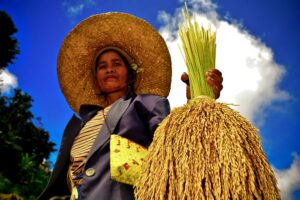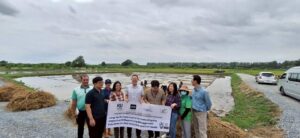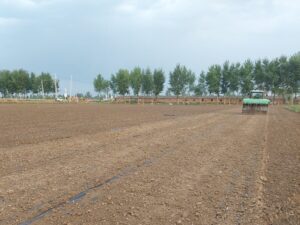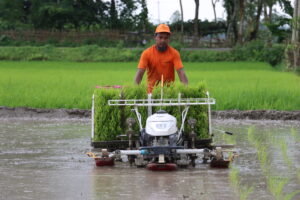By Libere Nkurunziza, Arlindo Matsinhe, and Myrtel Anne Valenzuela

Mozambique’s irrigation systems hold great promise, but much of it remains untapped. Smallholder farmers often operate public irrigation schemes without the knowledge or resources to maintain them. Pumps fall into disrepair, canals become clogged, and rice productivity suffers. Weak administrative structures with limited financial transparency, and gaps in technical training make the challenge even harder.
Of the 4,130 hectares of government-built irrigation infrastructure, only 20 percent is currently used for rice production. Despite substantial investments, frequent floods, cyclones, and extreme weather events, combined with limited technical expertise, have left much of the country’s rice potential unrealized.
Existing policies, including the Management Models for State-Constructed Irrigation Systems approved under Council of Ministers Resolution No. 10/2010, aim to address these gaps. Yet turning policy into effective, participatory management has proven difficult.
A Collaborative Path Forward
To address these challenges, the International Rice Research Institute (IRRI), Mozambique’s National Irrigation Institute (INIR), and partners launched the project “Enhancing Market Demanded Rice Productivity in Mozambique.” Funded by the Alliance for a Green Revolution in Africa (AGRA), the initiative brings together public and private institutions such as INIR, the National Agricultural Research Institute (IIAM), the Adventist Development and Relief Agency (ADRA), AgroInvest, and Macuse Agripecuria to strengthen technical capacity and market linkages.
At the community level, the project supports rice producer associations through business and governance models that enhance seed production, build the capacity to maintain irrigation infrastructure, and increase overall rice productivity.

A central focus under this effort is the hands-on training for local irrigation management committees and technicians from INIR and the District Agricultural Societies (SDAE) in Mopeia District, Zambezia province. Training covered three irrigation schemes across 445 hectares, teaching best practices for operation, maintenance, and management, as well as rice-specific guidance such as water requirements and farm business accounting.
“This training opened our eyes to the true costs of irrigation management. We now understand the importance of paying our fees on time to keep the pumps running and secure a successful season,” said Jone Manuel Tito, a farmer from the Paz irrigation scheme.
Farmers also welcomed the introduction of Alternate Wetting and Drying techniques. “Learning about AWD was a game-changer. We can save water, lower energy costs, and still maintain good yields,” said Tomás António, another farmer from the Paz irrigation scheme
Building Skills for Long-Term Sustainability
The training emphasized inclusivity and community cohesion. “Focusing youth and women’s participation was powerful. Our irrigation committee will be stronger and more inclusive going forward,” said a committee member from the Chiverano scheme.

Local technicians from Mopeia also saw the benefits, citing that training gave them the tools to provide precise guidance to farmers, from irrigation scheduling to AWD implementation.
The broader goal is to develop autonomous, business-oriented irrigation communities capable of managing resources effectively and linking production to market opportunities. Over time, IRRI and its partners hopes to expand the model across Mozambique, improving rice production, sustainability, and resilience against climate shocks.
Looking Ahead
Mozambique is laying the foundation for a more sustainable rice value chain by building on the skills of farmers and local technicians. The first round of training is just the start, with plans to extend similar programs to other irrigation schemes in Zambezia and Sofala provinces, eventually reaching more than 200 certified seed producers.





